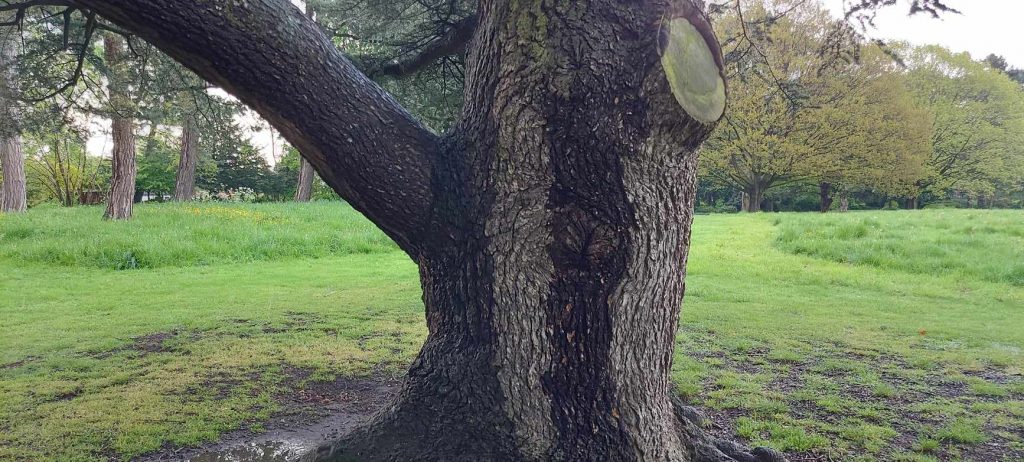
The Shaman was grim.
“The warning is loud and clear! If things are not mended soon, there will be nothing left…except a sun-scorched land without water and an air you cannot breathe!”
The listeners shivered.
“It will be the Land of the Un-Dead! Mark it, the warning from the Tree of Life! Change or die!”
They gasped.
The Baobab had spoken to his priest!
They were doomed—the small community of the Guards of the Trees (GoT). Dwindling fast—their numbers; like disappearing eddies—in a landscape rapidly changing, from pastoral-rural to the industrial-commercial.
Mid-morning light shone with the brightness of a desert sun. The once-verdant land was already bleak, stripped, bare, dotted with verticals, all steel, glass and concrete—bald giants outlined against a smoggy sky.
Only a stump remained of a once majestic tree.
Scary!
The Baobab had been sawed off in the early hours of the morning, while the world slept.
Sacrilege!
The spot looked like a raw wound. In the distance, loomed the blocks of apartments; a cluster of ugly giants that dominated the scene of the murder, taunting, horrid monsters hungry for green and open lands.
The tiny community stood in silence—poor peasants and casual workers—the rag-tag band of the zealous watchers of the sacred tree.
The Tree of Life!
How they were tricked by the Foes!
While the former snored after a large meal served by the Foes, their minions chopped down the tree that had inspired awe in the simple devout folks working the land.
They cried—lost children, helpless and powerless—before the supervisor who laughed at their belief system and dire warnings.
“Idiots!” the supervisor laughed. “Trees do not speak! They are just timber and leaves. Fetch good money on the market! Stop wailing!”
His henchmen stood with guns and tractors.
“Vacate this land. It belongs to the Corporation now,” he hissed. “Three hours.”
They were badly shaken by an evil force called the Foes, an inhuman collective that did not bother about anything other than its selfish pursuits, own agenda and ruthlessly demolished every obstacle on the way towards realization of that goal—super profits from its enterprise of loot and destruction of earth.
The GoT stood motionless.
“Go! Leave!” barked the supervisor. “You are trespassers!”
“No, we are not! This belongs to the oldest tribal family who have allowed us to live and till their vast land in this sprawling forest for decades,” one of the younger workers protested in a shrill tone. “You are not the owner. You cannot push us out from our huts. We will not budge. Not yield to threats! You are the trespassers!”
The supervisor retorted: “Fools! The tribal family sold the land to the Big Corporation a month ago. Understand? You are homeless now!”
The GoT exhaled sharply, grew quiet, hit hard by this betrayal.
Crestfallen, the group became silent and morose!
The angry Shaman stood defiant. “The Big Corporation, our sworn Foes! Listen! Listen carefully to the warning by the Ancient Tree. You know its history?”
The supervisor said nothing. Only glared at the lone challenger.
“Almost 2,000-year-old, this tree, the benevolent one that nourished tribes and animals under its protection, this Baobab, with scarce water stored inside its thick trunk and fruits and flowers. You cut it down! You will pay heavily for this murder!” He shook violently going into trance, eyes half shut, tongue darting, “The Foes are inviting the wrath of the God by this desecration! Beware of the Curse of the Baobab!”
The goons of the Foes stood smiling, eyes mocking, arms crossed, indulging the old frail man with grey beard, beads, matted hair and blood-shot eyes, a tattered skirt and a bunch of feathers tied on a short pole as a totem, delivering his prophesy in a raspy voice.
“Heathen! Savages!” the supervisor said loudly to the assembly of believers facing the sceptics on the other side of the stump, a provisional border between the mighty Corporation and the displaced tribals.
The Shaman drew up to his full height and said in a changed voice:
“The Baobab says it will return as a ghost! And wreak havoc here, this new settlement done on his wounded breast and body!”
The GoT shrieked and fell down at the stump, prostrating in the dust, seeking forgiveness of the fallen colossal.
They sobbed, “We have been orphaned! Have pity, O, Great Baobab!”
The supervisor stepped near the band of grieving folks and changing tactics, said in a soothing voice:
“The Shaman is phony! Don’t listen to this imposter! Join us. We are going to develop this rocky land into a landscaped property of immense value. Huge complexes of apartment buildings, swimming pools, gardens, schools, clinics and hospitals. It is called the Paradise,” the supervisor paused for effect and after few seconds, resumed the appeal, “Our bosses are kind and considerate. You will be employed as workers. Get good wages, food and shelter here. Schooling for children. The bosses care for their workers. In their saw mills and cement factories, you and kids can be absorbed as the staff on good daily wages! Ha!”
The GoT stood silent—undecided.
The Shaman laughed derisively: “You have no heart! You are mocking the tradition of a shaman. The knowledge, skills and lore passed down from one generation to another. We are special souls, guardians of the sacred, connected with the spirits of the land, water and sky. These elements speak through us. We will not join the Foes, murderers and thieves! Go away!”
The supervisor laughed and dismissed them with a smirk. “Idiots! Ignorant pagans! Three hours only! Leave or join us!”
The GoT left with few bags and bundles strapped on the donkeys, and cats, dogs and hens—their worldly possessions.
The Shaman collected the big chunks of the soil from that spot as a totem and brought up the rear with his family.
The army of bulldozers and excavators and cranes arrived soon after.
The woodland was systematically assaulted. The discordant sounds of the dynamite and saw chains and hatchets echoed through a thick forest that was once an enclave of purity and peace.
Machines and men combined in the rape and pillage of the earth and the rivers running in the heart of the deep forest, home to rare birds, trees and animals and flowers.
It went on for months—ripping, digging—the destruction, unchecked, cynical, merciless!
The Tree of Life was completely stamped out.
Its bleeding spirit watched the large-scale destruction of the rich and fertile soil that had yielded rice and millets and vegetables; thickets of trees were felled and bushes, vines and shrubs cleared cruelly by the gangs of matchet-wielding men; the cleared ground dug deep and deeper, disturbing the water table, top soil; hills were raided for stones and sand, reducing them to mere bald mounds.
Finally, the housing-cum-residential project was announced by the Big Corporation, in the presence of the top bank officials, investors and political leaders, including a minister. Media announced the project in their infra columns, paid news but sold as reports by their real-estate team of experts.
The massive project attracted good response and was sold out within a few days.
Second phase of the Paradise was launched with seductive discounts and offers.
In fact, the Big Corporation bought the entire range of adjoining forests, hills, farms and ponds at a cheap rate, displacing more tribals in a single stroke, and, destroying flora and fauna in a repeat of ruthless operation, ignored by the parliament and the press, except some urban activists made ineffective by a counter narrative of urban growth and development for the urgent needs of city expanding fast.
Over the months, more forests were cleared and only the barren land remained for further development by the teams of the biggest realtor conglomerate of the world eyeing the sea, ocean and land of the poor, impoverished nation.
The Corporation sold the upcoming projects as the New Greens as exclusive gateways to a life-style in the midst of nature for the elite through a media blitz, on-site events, early discounts, multi-colour brochures, ads and calls.
Sold as attractive gated communities with all the world-class facilities in a post-colonial country, haven for global investments for quick returns and an easy life supported by cheap manual labour; a must-have holiday address for the celebs and successful honchoes; a romping ground for the super-rich players.
Self-contained enclaves with helipads and luxury villas and private cinemas and casinos spread out among denuded hills and bare valleys.
The Curse of the Baobab was forgotten as a figment of the primitive imagination, superstition of an uncultivated mind.
The Corporate minted gold out of the dirt.
and planned more of such raiding of the cheap forest lands and quick conquests
One night, the Curse did strike.
A strange fever gripped the residents of the Paradise. A fever with cough, cold and lung and breathing problems. It spread in the land and spread across the world—borderless epidemic, fatal, quick contagion and a silent killer!
The world stopped in its mad tracks!
The air grew noxious, damp and lack of tree cover made breathing tough!
Lungs got affected.
Air quality decreased.
Emergencies were sounded by the governments and WHO (World Health Organisation).
Few weeks later, series of tsunamis and earthquakes and forest fires destroyed the global properties and profits of the Big Corporation—a trans-national oligarchy; mastermind of mergers and acquisitions.
The loss was monumental.
Its stocks went down.
Profits plummeted.
Staff downsized.
The post-industrial plague resulted in the loss of billions for the Big Corporation!
Its multi-national offices closed down in some of the capitals of the world!
From being a top Fortune-500 company, it went down to the bottom of the pile!
Then the teenage son of the CEO got the rare fever and gasped for breath.
The medicines did not work.
He understood the pain of the poor who were not given proper treatment in the hospitals run by the Big Corporation due to their inability to pay exorbitant medical services—only the elites could somehow manage the medical costs involved in long procedures and buy injections on the black-markets prescribed by the robotic system of the care-givers!
The vampires—finally out in the open!
The utopia turned into dystopia!
Riots broke out in many cities.
The poor could not afford the inflated medical care and died in numbers that were staggering, never discussed by the governments.
Adding to the pandemic was the extreme change in climate: summers that were winters; winters, summers; droughts, flooding; scarcity and incessant rains at a stretch.
And mutations of the fever.
First the son.
Then the family got affected.
The anxious father was told of the Enchanted Forest!
A forest that promised fabulous solutions to some of the ills of the civilization!
He went there with a select staff.
And found things that surprised the visitors from another planet!
“Welcome to the Dhara Family,” the young volunteer said with a smile.
The paths, lined by trees, led to a self-sustained community. Cottages, schools, hospitals, kitchens, working-sheds, farms, tool houses—everything arranged around trees and shrubs. A sparkling river flowed in the heart of the forest full of verdant hills, birds and animals.
A green oasis!
“Meet our Guardian!”
The five guests were astonished to see the presiding deity: The Baobab!
Spread in its austere beauty and wide girth, the tree stood in its natural splendour, an evolution of millions of years showcased by God in this stocky figure.
The volunteer bent down in reverence, eyes closed, hands clasped, saying softly, “The Tree of Life! Please accept greetings of our guests!”
She mumbled some mantra.
The group, overawed by this majestic sight, bowed down heads and folded hands.
Next, they were greeted by the Shaman: “Welcome! The Forest is Enchanted. Listen to its old songs and benefit from its benediction!”
The CEO never felt so small!
The Shaman looked same, even healthier. No trace of malice or bitterness in his tone or gaze.
And, contented.
“The forest is made enchanted by the people. My son, Masters in agriculture, came back and developed this remote treeless and barren area into a thick forest by planting, over the years, the native varieties of trees and fruits, along with a team of dedicated young men and women from nearby tribal hamlets, displaced by the Big Corporation.”
The CEO was stunned by the strange transformation.
“Rest is done by us, the members, young and old here. We embraced the organic way of living and created a unique ecosystem out of an expanding desert!” The volunteer explained. “Each month, at least hundred applications are received for volunteering here for this project.”
“And a better and meaningful life,” said another voice. “Paying back to mother earth, collective debts!”
They turned around to see the agro-scientist, the founder of the famous Enchanted Forest, whose pictures were staple of the Internet. He was frequently interviewed by the global media and quoted by the experts.
Films and documentaries were made on him and the forest, a miracle.
“Meet my son Adi!” The Shaman said with pride.
“The strange fever hardly touched us! We work hard and lead a life organically linked to nature. Our guardian tree blesses our ceaseless efforts of revival!”
After spending two days and three nights, they returned with seeds, plants and herbal medicines that promised fast relief.
“Plant the holy seeds in the corner of your house…and feel the benedictions of the Spirit of the Enchanted Forest!” the Shaman said. “Do it for your grandkids!”
Adi added, “We cannot wait for the governments to intervene and try to stop climate change—they hardly do anything! Corporations failing. We should not depend on them but seize the day. We did that only!”
The CEO was impressed: “Great! From dystopia to utopia…”
“Sorry!” the scientist interrupted. “It is all real! You have witnessed that. It is possible.”
As they were returning to the big city, the accountant said, “Sir, should not we buy tons of their blessed seeds and sell them on the overseas markets under our agro brand? A good business opportunity!”
The CEO glared. “Not everything is for sale!”
That night, the CEO saw the Tree of Life smiling in his dream.

Sunil Sharma is a humble word-worshipper: catcher of elusive sounds, meanings and images.
He has published 26 creative and critical books— joint and solo.
A winner of, among others, the Golden Globe Award-2023, and, Nissim Award for Excellence for the novel Minotaur.
His poems were included in the prestigious UN project: Happiness: The Delight-Tree: An Anthology of Contemporary International Poetry, 2015.
Editor of the monthly Setu journal (English).
For details, please visit the website.
You can find more of Sunil’s work here on Ink Pantry.

